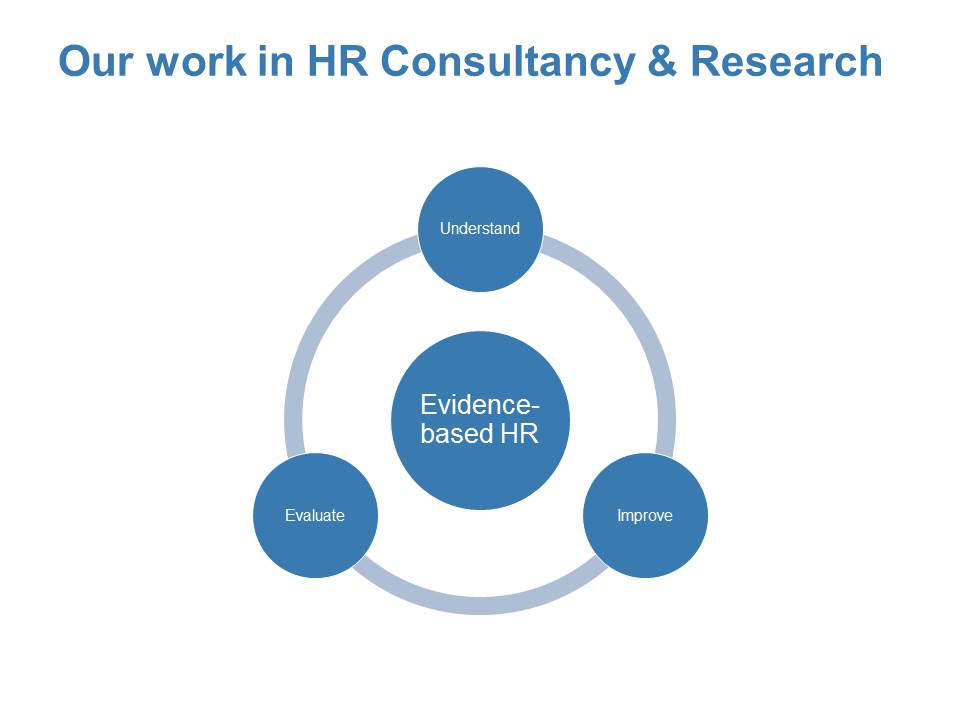Who’s afraid of evidence-based HR?
3 Jul 2019
 Ed Griffin, Director of HR Consultancy and Research
Ed Griffin, Director of HR Consultancy and Research
I believe that HR should be in the business of ‘making work better’. But as we all know those three simple words have a lot more complexity sitting behind them. At its core this should mean that we aim to have more attractive, healthy, productive and sustainable workplaces.
However, if delivering this is the role of HR, then that’s a massive agenda. It’s hardly surprising that, at times, HR professionals have resorted to approaches that, on the face of it, have an intuitive appeal but lack evidence for their impact or benefit. For example, bowls of fruit at work as part of a well-being strategy or heavy reliance on personality testing for recruitment are both contested practices which have dedicated adherents! There’s a risk that delivering initiatives without a robust evidence base, has a feel good factor but delivers little practical benefit in the workplace.
Part of the difficulty for HR is that given the range and nature of the challenges to be addressed, simple solutions can be very attractive. As an HR Director I found that external providers were frequently offering products and services that were standardised and commoditised. The price could be attractive and the idea of not having to tailor something was appealing, but without the right evidence and understanding it could be a false economy.
I’ve been interested for a long time in the use of theory, evidence and practice at work. My experience has consistently been that I’ve felt more confident and effective as a practitioner when I have had a good understanding of the theory behind what I’m doing. Knowing that what I was proposing had a strong foundation to it and that I had appropriate evidence enabled me to deal with challenges, or with someone proposing an alternative that was based on their preference rather than anything substantial.
The dreaded CEO command of “what I’d like to do is….” when there was no data or evidence to support it can be hard to resist! It’s often only possible to challenge that sort of command when you are confident of your knowledge and understanding, as well as being able to offer a more suitable option. Otherwise, making the challenge is simply a career-threatening opportunity!
The idea of “evidence-based HR” has been around some years now, the idea adopted from approaches developed in the 1960s and 70s of “evidence-based medicine. (HR Magazine previously provided a useful summary of the background). In the UK we have seen evidence-based practice in HR and management championed by a range of individuals and organisations, including ourselves. A good source of academic information and provocation on this, for example, is IES Honorary Fellow Professor Rob Briner.
I’m convinced that the provocation to seek evidence is an important part of how we push the disciplines which more organisations would benefit from adopting. Part of the attraction for me as an HR practitioner in joining IES has been the history we have of providing the evidence and understanding for better HR practice in organisations.
We have an extensive set of research evidence and evaluation studies based on decades of work with organisations across all sectors. Much of this is freely available as part of our role in disseminating best practice and delivering our public benefit obligations as a charity- https://www.employment-studies.co.uk/publications.
Our approach in helping to improve work is based on three associated disciplines – understand what is happening now in our context and what research currently tells us about our options for action, improve practice based on that understanding and evaluate what you do to maximise impact and identify where and how to improve further.

The challenge as an HR practitioner is often the belief that we only have the time to ‘improve’ and that the ‘understanding’ and ‘evaluation’ components are, in some way, optional academic luxuries. However, I want to challenge that and suggest that time spent on applied understanding and evaluation is more likely to generate more impactful and sustained improvement. It also means that you will learn what really works for your organisation and what doesn’t.
That feedback cycle enables and encourages learning and continuous improvement. Pace is not everything, although in our busy, connected world it’s all too easy to fall into the trap that being seen to act quickly is always more important than delivering something which works and which has buy-in from stakeholders.
As I start my tenure as the IES Director of HR Consultancy and Research my challenge to all IES Members and clients is to work with IES to take the time to step back and think about your evidence base. Doing so can build a deeper understanding into the way you go about delivering and evaluating the improvements you are trying to make in your organisation.
If you share my view that HR needs to play a major part in ‘making work better’, why don’t you come and talk to me about how IES can help you find evidence-based ways of making this happen?
Any views expressed are those of the author and not necessarily those of the Institute as a whole.

